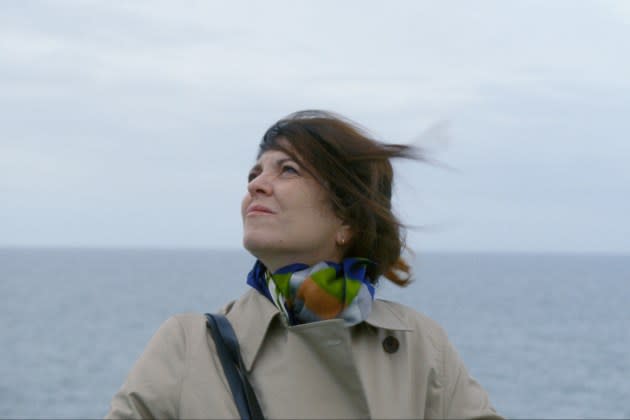‘This Life of Mine’ Review: A Middle-Aged Woman Collapses and Rebuilds In Sophie Fillières’ Bittersweet Final Feature
- Oops!Something went wrong.Please try again later.

What is poignant about “This Life of Mine” — the final film by French writer-director Sophie Fillières — is all but impossible to extract from the beleaguered circumstances of its creation. Aged just 58, Fillières died last summer, shortly after completing the shoot of this wistful, somewhat autofictional study of midlife feminine crisis. Postproduction was supervised by her children, the actors Agathe and Adam Bonitzer, with the guidance of notes Fillières made in hospital, when it became clear to her that she’d never complete the project herself. What emerges from this process is a suitably elegiac testament to Fillières’ curious comic voice, centered on a fragile alter ego — played with a game lack of vanity by Agnès Jaoui — fearful that her life is passing her by. As filmmaking, however, it wants for shape and drive, and the intuitive editorial decision-making that only an author can bring to her work.
Heavy on wordplay and loose conversational drift, Fillières’ brand of gently offbeat comedy — best represented by such films as 2005’s “Gentille” and 2014’s “If You Don’t, I Will,” both starring Emmanuelle Devos — has won her a dedicated following in France, making the posthumous premiere of “This Life of Mine” as this year’s Cannes Directors’ Fortnight opener something of a domestic event. Beyond home turf, however, her work has had a harder time catching on with distributors and audiences. This film, with its bevy of cameos and in-jokes specific to the French arthouse scene, is unlikely to break the pattern, but the Fillières faithful will hold it especially dear.
More from Variety
'Fall' Sequel to Be Directed by 'Jigsaw' Helmers the Spierig Brothers for Capstone (EXCLUSIVE)
Chile's Quijote Films, Arte+ Unite for 'The Mysterious Gaze of the Flamingo' (EXCLUSIVE)
The film’s bland English-language title is already indicative of how vulnerable Fillières’ writing is to translation. The French title, “Ma vie ma gueule,” makes a wryly derogatory reference to the middle-aged mug of protagonist Barberie Bichette (Jaoui), who spends a considerable amount of time standing before the mirror, hoping somehow to see a different woman staring back at her. Fiftysomething, separated from her husband and weary of her job as an advertising copywriter — she’s also a published poet, though few seem to acknowledge her as such — she’s shuffling toward a nervous breakdown that even her therapist doesn’t seem especially invested in preventing.
Barberie’s adult son Junior (Édouard Sulpice) and teenage daughter Rose (Angélina Woreth) regard her with bemused affection and contempt, respectively, though both have long ceased to be dependent on her. Years of feeling unseen and unneeded have tipped Barberie’s empty-nester loneliness into the realm of mental illness. When a perplexing encounter with Bertrand (Laurent Capelluto) — a man who claims to be a former flame, but of whom she has no memory — places her in a dissociative state, she checks herself into a psychiatric care facility, hoping to regather a disintegrating life. Jaoui plays Barberie’s interior collapse with affecting understatement, a sense of strenuous calm masking more chaotic insecurities. “I don’t know if I know what my nature is,” she admits to her therapist, in a line that will strike a chord with many viewers of a certain disposition.
Like many of Fillières’ characters, Barberie specializes in such casual self-scrutiny. The film around her, however, hasn’t the same clarity. Too many scenes of her erratic behavior and befuddling interactions with others feel merely adjacent rather than cumulative: Minus the director’s first-hand input, editor François Quiqueré assembles what may be an appropriately diffuse patchwork of a life in disarray, but the structuring stresses and specificities that make a rich character study are missing.
A third-act pivot into outright whimsy, as Barberie journeys to Scotland to find her own personal place in the world, sits oddly with the more stoic realism of her psychological recovery. With Emmanuelle Collinot’s lensing consistent in its flat brightness, and no musical score save for some light banjo strumming by quirky actor-musician Philippe Katerine (here cast as a kind of fuzzy mascot for free-minded living), the film’s formal sparseness provides few stylistic cues for its peculiar tonal switches. Still, one can understand why the late director’s heirs and collaborators have fashioned the final film to foreground her script as much as possible. “This Life of Mine” presents a woman’s words — written or spoken, sometimes only to herself — as her final defense from oblivion.
Best of Variety
Sign up for Variety’s Newsletter. For the latest news, follow us on Facebook, Twitter, and Instagram.
